The Regional Transportation District's board will decide this summer whether to ban passengers from riding its buses and trains "indefinitely."
The proposal is part of a larger planned update to the agency's passenger code of conduct aimed at curbing behaviors that make commuters feel unsafe. The update has already received preliminary approval from a board committee, but its consideration by the full board was postponed last week.
The delay is for two reasons: First, the shooting death of RTD Chief of Police Dr. Joel Fitzgerald's son, Christopher Fitzgerald, a police officer in Philadelphia.
"Our hearts are broken for the chief and his family," RTD board chair Lynn Guissinger said last week.
The second reason for the delay is to allow for more public input. RTD's most recent update to its passenger rules, in 2020, was softened after input from groups, including the Colorado Coalition for the Homeless (who is a financial supporter of CPR News, Denverite's parent organization).
But as RTD drafted new updates to its passenger rules this time, it did so privately. The new changes were made public in a January Denverite article, and quickly criticized by advocates like the Denver Streets Partnership, the American Civil Liberties Union, and the Colorado Coalition for the Homeless.
In a letter to RTD, the coalition called out three of RTD's proposed behavior bans that it says target people experiencing homelessness: unauthorized use of power outlets, occupying RTD property when not using its services, and riding the system indefinitely once a fare expires.
"[These] changes have been proposed and made public with no stakeholder engagement, no feedback from the public, and no conversations by people who will be directly impacted by the policy," wrote Cathy Alderman, chief communications and public policy officer for the Colorado Coalition for the Homeless.

With that in mind, we rode RTD's system for about 20 hours on a cold, snowy day last week to meet people who'd be directly impacted. To keep things simple, we asked people only about the proposed ban that "particularly troubled" the coalition: riding indefinitely. Here's what we saw and heard.
3:18 a.m. - Evans Station in Denver
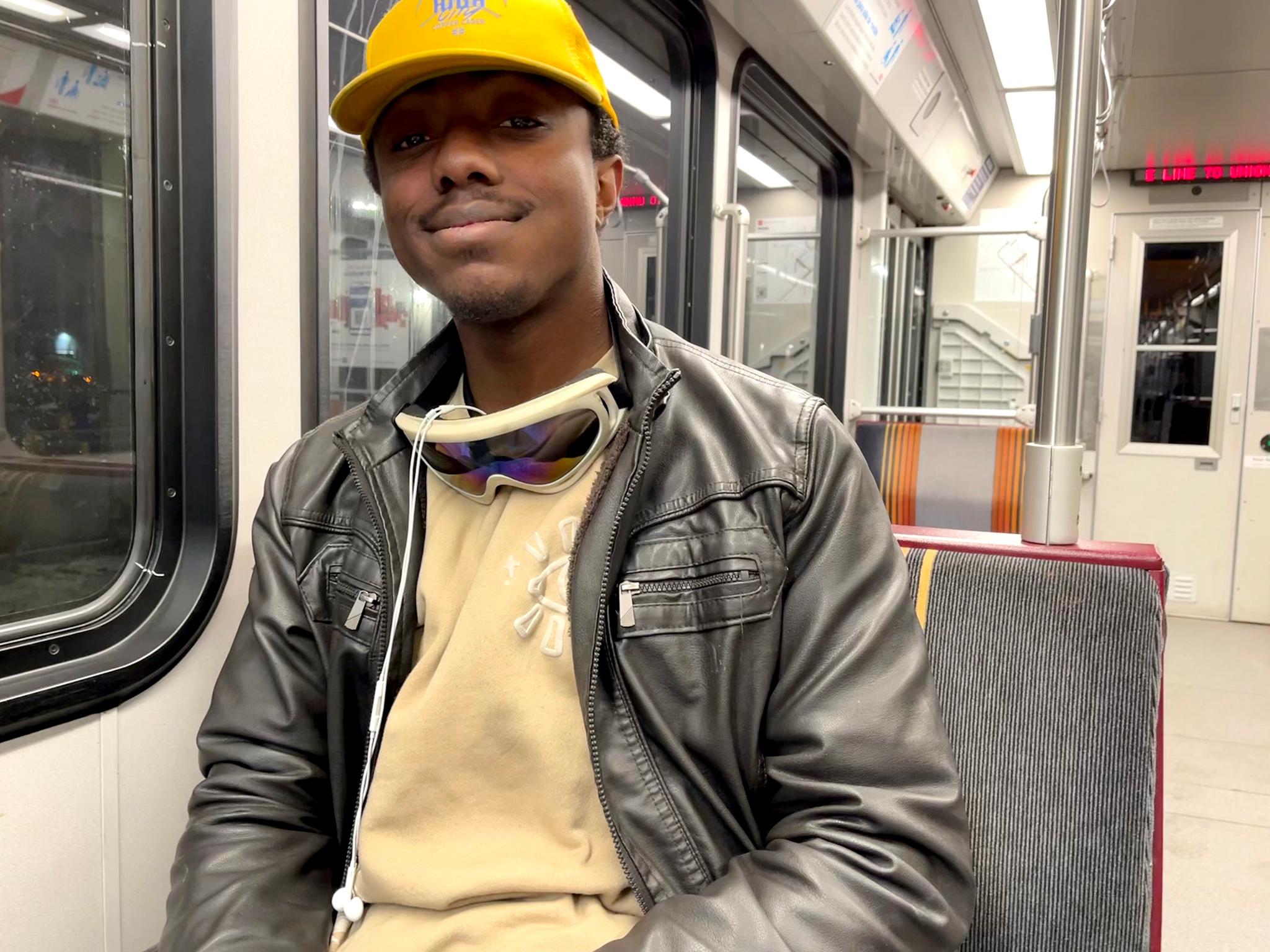
Makarios Boyd had been waiting for more than three hours by the time the first train of the morning showed up at Evans Station. The 21-year-old aspiring musician and dancer had finished the late shift at a nearby gas station, and then missed the last train of the night back home.
So he killed time under the hulking viaduct that carries Evans Avenue over Santa Fe Drive and RTD's light rail tracks. "I was just chilling there, trying to keep warm," he said.
Boyd's typical commute home to Green Valley Ranch takes two hours, and he's spent much longer stretches of time on RTD's trains. He did laps on them late last year when he was homeless for a few months, and called RTD's proposed ban on riding indefinitely "bogus."
"There's some people that actually have to do that sometimes," he said. "It's a sad thing, but it's real life. That's all I can say."
3:50 a.m. - Union Station
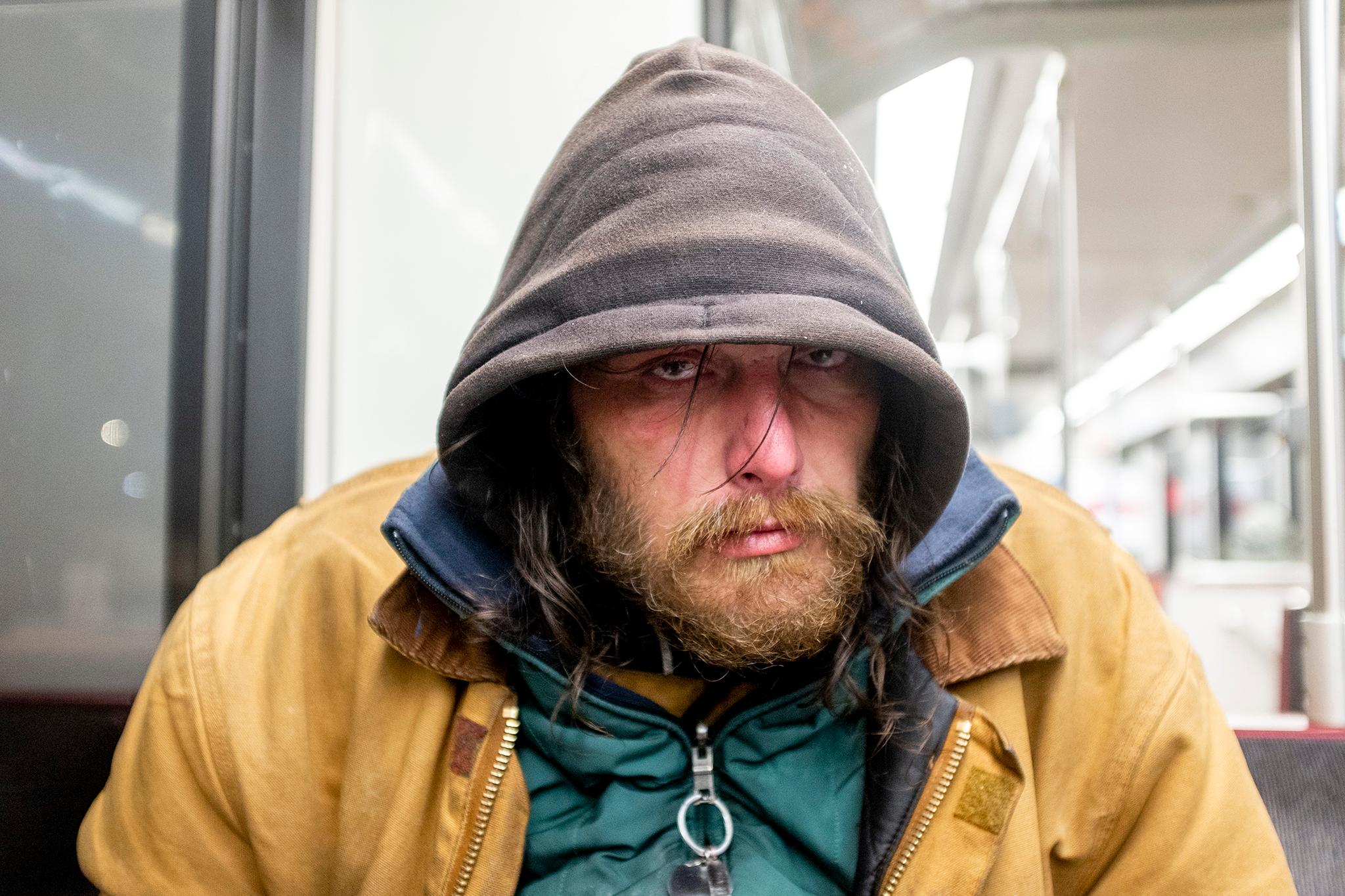
Ricci Autry didn't get any sleep the night before, either. He'd walked downtown for hours waiting for the first W-Line train of the day to leave Union Station.
"The shelters out here are overcrowded and full of people with scabies and other nastiness," he said. "I'd rather be out here on the street and know that what little stuff I do have is not getting stolen."
So Autry, 39, has been hopping trains for about six months. He said he was a successful small business owner before his life started going haywire in early 2020. He said he was shot in the chest by his former roommate and then caught COVID early in the pandemic. By last September, he was evicted from the apartment he'd shared with a friend.
"This kind of stuff can happen to anybody," he said. "People act like they don't care because it's not happening to them, but it could happen to them at any time."
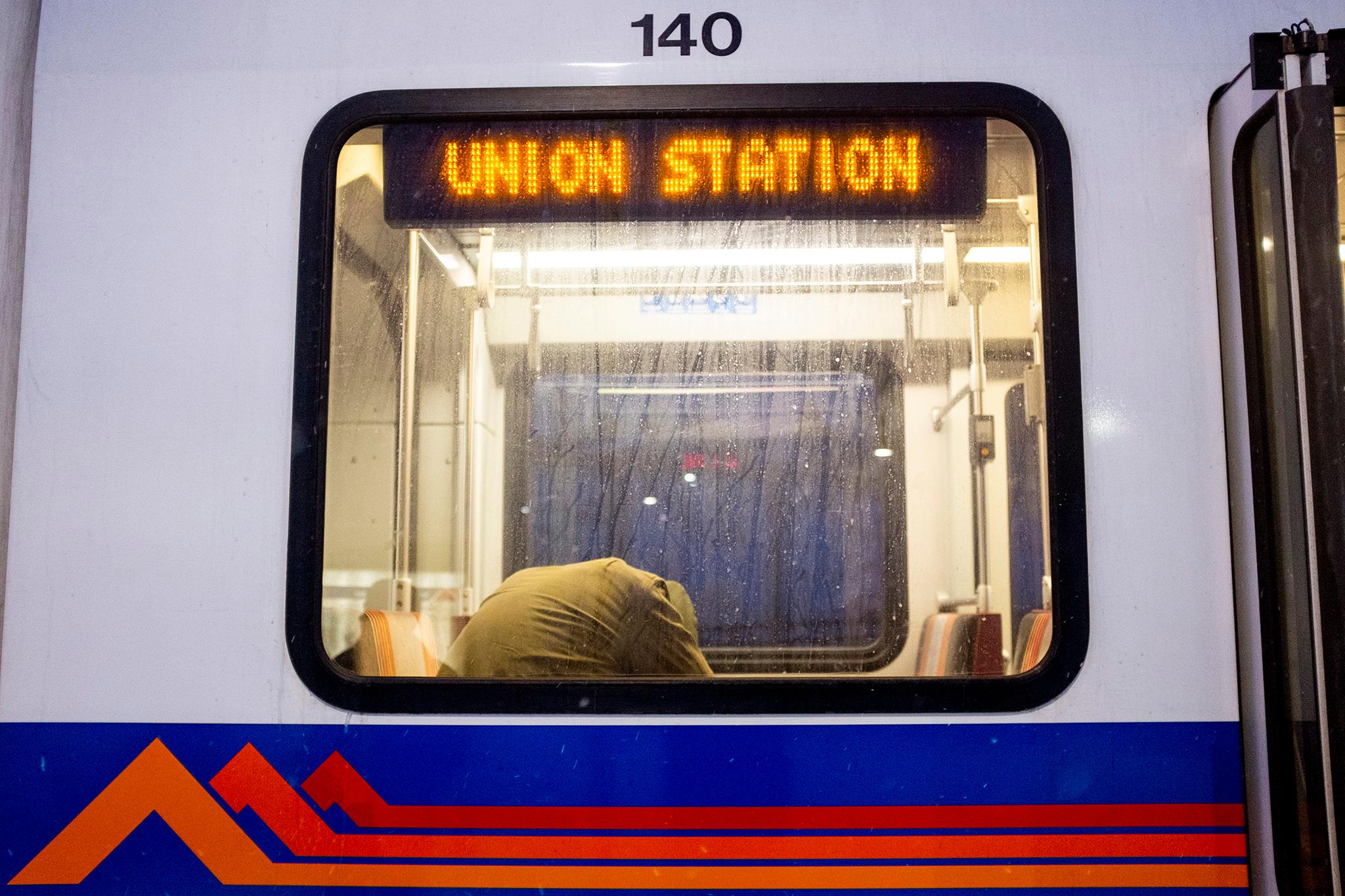
Autry said he's still dealing with ongoing mental issues from the gunshot wound, which makes it difficult for him to access resources and try to get back on his feet. So in the meantime, he's just trying to stay alive.
"The only thing I can do right now is ride the rails," he said.
This reporter told Autry about RTD's proposed code of conduct changes that would make it more difficult for him to ride the trains. He asked a few followup questions, then concluded, "They want to keep homeless people from being on the train. Stupid. It's probably going to pass, and there's nothing I can do about it."
His voice started to crack and waiver.
"I feel forgotten," he said. "Nobody cares."

4:10 a.m. - W Line in Lakewood
A man with a walker yelled obscenities at everyone and no one. He reached a crescendo, shouting, "Your Colorado laws are f-d, f-d, f-d." Other passengers ignored him.
Then, as the train approached the Oak Station in Lakewood, the man stood and walked toward three passengers brandishing a Leatherman-style multitool. He stopped about 10 feet away, then walked back to his seat.
Later, the train was silent as the man slept on the floor.
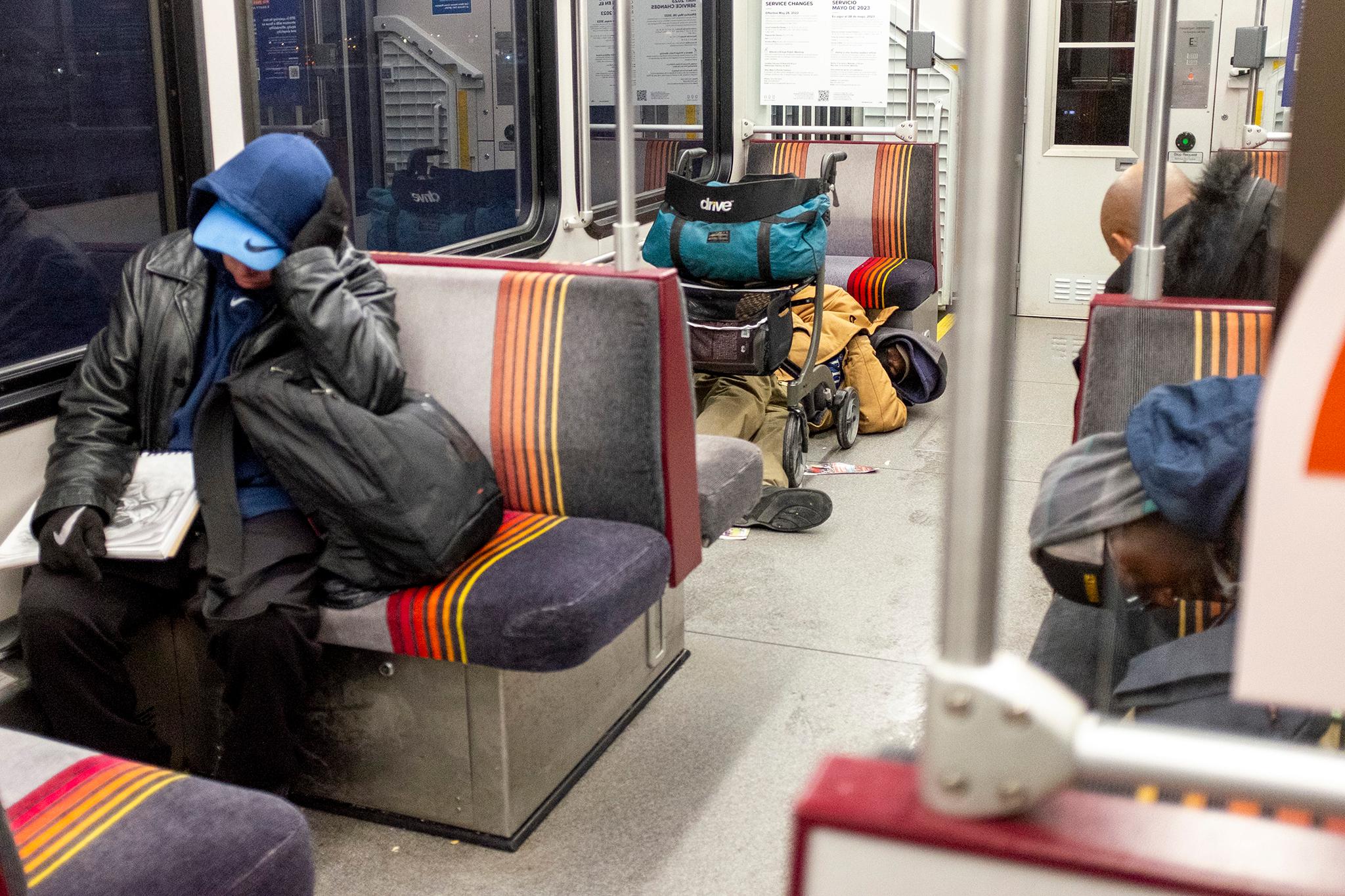
5:15 a.m. - W Line in Lakewood
The W-Line train started to fill up with downtown-bound commuters. Jonathan Bisset of Lakewood held his scooter tight as he sat toward the front of the first train car.
"I got tired of smelling drugs in the morning, so I came over to the first train," he said. "The homeless population will normally be in the second and third train."
Bisset, 26, said he's been riding RTD ever since he moved to Colorado from Florida five years ago. But recent attacks on the W-Line have him thinking seriously about buying a car. He's also been carrying pepper spray, a taser, and a baton.

"I have no trust. [I'm] constantly on edge in the morning," he said.
A few months ago, he said, two men cornered him and grabbed at his scooter. So he pulled out his weapons and held them ready. The moment the doors opened at Union Station, he said, he ran.
He's reported incidents via RTD's "Transit Watch" app multiple times, he said, but nothing happened. "The driver doesn't stop. Police don't show up," he said.
RTD police chief Fitzgerald wants to triple the size of the agency's police force to 140 officers by 2025.
"We are hiring," he told Denverite in January.
6:30 a.m. - W Line in Golden
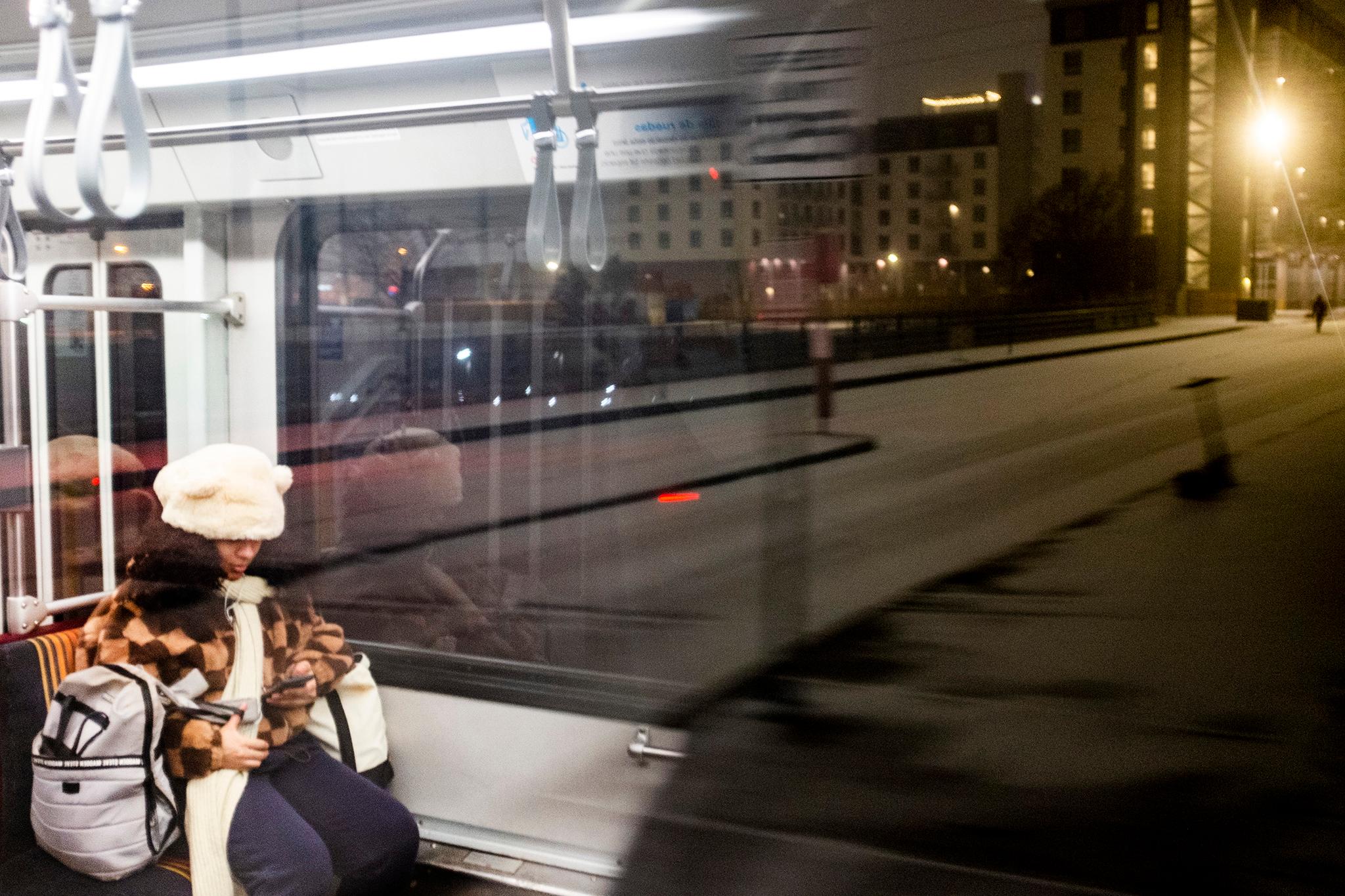
A W-Line train pulled into its last stop at the Jefferson County Government Center. Snow was swirling outside. Typically, operators walk through the train cars at this point and tell people to leave. But this time that didn't happen.
"As long as they aren't smoking, I let them sleep," an operator told a fellow employee as they walked through the snow.
7:00 a.m. - W Line in Denver

Light was beginning to filter into the train cars as Jay Rodriguez, 25, and Michelle Lopez, 21, huddled together under a blanket on the W-Line. Rodriguez, an underemployed tattoo artist, said the pair spent the night outside and planned to ride all day to stay warm.
"They shouldn't kick us off," Rodriguez said of RTD's proposed changes. "That's messed up."
Rodriguez said he'd like to find a job and get off the streets. He blamed high housing costs and the police for his situation.
"They just want to see us go to jail," Rodriguez said, saying he's been targeted for "petty stuff."
He added: "That's what they think help is."
8:20 a.m. - Union Station Great Hall
The stalls were full in the men's room in Union Station's Great Hall. A security officer walked in and declared, "Sorry to cut you all short, but I have to ask you all to leave."
"I'm still taking a s-," someone said from a stall.
"There's a hint of fentanyl, and I'm trying to figure out which stall it's in," the guard says.
Union Station upped its security in the privately run Great Hall in 2020, including at these restrooms. Guards now routinely try to limit entry to paying customers of nearby shops and restaurants.
Next door, in RTD's underground bus depot, the agency recently reopened its bathrooms after months of fentanyl contamination mitigation. They're open to the public, but guards are posted at the doors and limit entry to two people at a time.
It's a vital and vanishingly rare utility in Denver, which, like many American cities, has very few public restrooms. Elsewhere in the world, like Paris and Sydney, they are far more widely available.
9:45 a.m. - D-Line in Littleton, Englewood and Denver

Wade Moxely and his son Wade Jr. say they used to own a successful flooring business, installing tile and luxury vinyl plank in dispensaries, churches, and other places. Then business dried up during the pandemic and the physically intensive work caught up to Wade Sr.'s 49-year-old body.
"The last job that I was on took a toll on me," he said as we rode the D-Line from Littleton to downtown Denver.
The father and son were evicted from their apartment and spent a few months in extended stay motels, before weekly costs rose to $700 a week and forced them to move out. Shortly after, Wade Sr. said he was extradited to Mississippi on an old warrant over a drug possession charge and ended up in pre-trial detention for six months.
The case was eventually "squashed," Wade said, but the whole ordeal left Wade Jr. on the streets while he was gone. They've since been reunited, sleeping in train station elevators, overnight shelters they say are like a "third-world prison," and, the night before I met them, under the Santa Fe Drive bridge at Hampden Avenue.
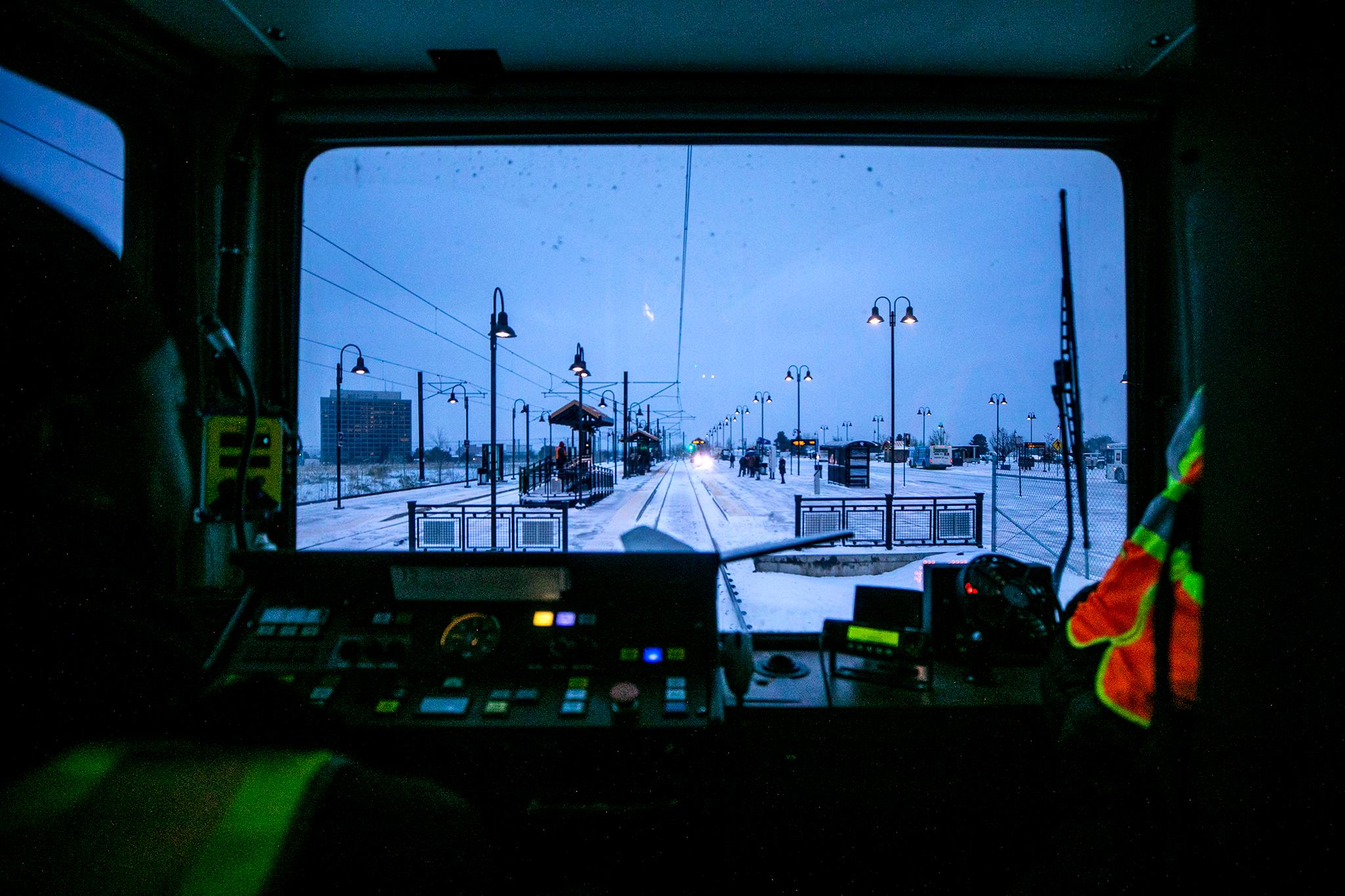
Like so many others, they also use the trains to get warm.
"I'd never, ever in a million years imagined that I would be here, especially with a long list of friends that have resources," Wade Sr. said. "But pride stands in the way of saying, 'Hey, man, can me and my son come and kick it on the couch for the next six weeks?'"
The two men say they're working with social service providers to get an apartment and other resources. But it's a slow grind, they say, and high housing costs constantly weigh on their minds.
"It's mind-boggling how quickly the rent is rising," said 21-year-old Wade Jr. "It makes me think about doing things I shouldn't do ... like selling drugs."
Wade Sr. added: "To consistently be able to pay rent on a monthly basis -- even if it's illegal -- I can't think of anything."
10:53 a.m. - D Line in Denver
A train sits for longer than it should at the 10th and Osage Station in Denver's Lincoln Park neighborhood. Eventually, two security guards enter and remove a man from the train.
"Wake up. You've got fentanyl all over your foot, dude," one says.
The man protests, briefly.
"Hop off," the guard says again.
The man leaves the train and slowly walks away.
12:15 p.m. - E-Line in Centennial, Lone Tree
Amy Haefner was returning home to Parker from downtown Denver on the E-Line. The commuter makes the trip twice a week and said she feels safe most of the time. Still, she said, she's happy to hear that RTD is considering an explicit ban on all-day riding.
"If you buy a ticket, you're more than welcome to ride," Haefner said. "But it should be for a purpose other than shelter. We're failing the system if our public shelters are a train."
A few minutes later, a woman behind us began to smoke something. A chemical smell filled the air, and Haefner's tone changed significantly.
"I'd be reluctant to have my 18-year-old or 19-year-old daughter taking this train downtown," she said.
2:10 p.m. - 15L bus in Aurora
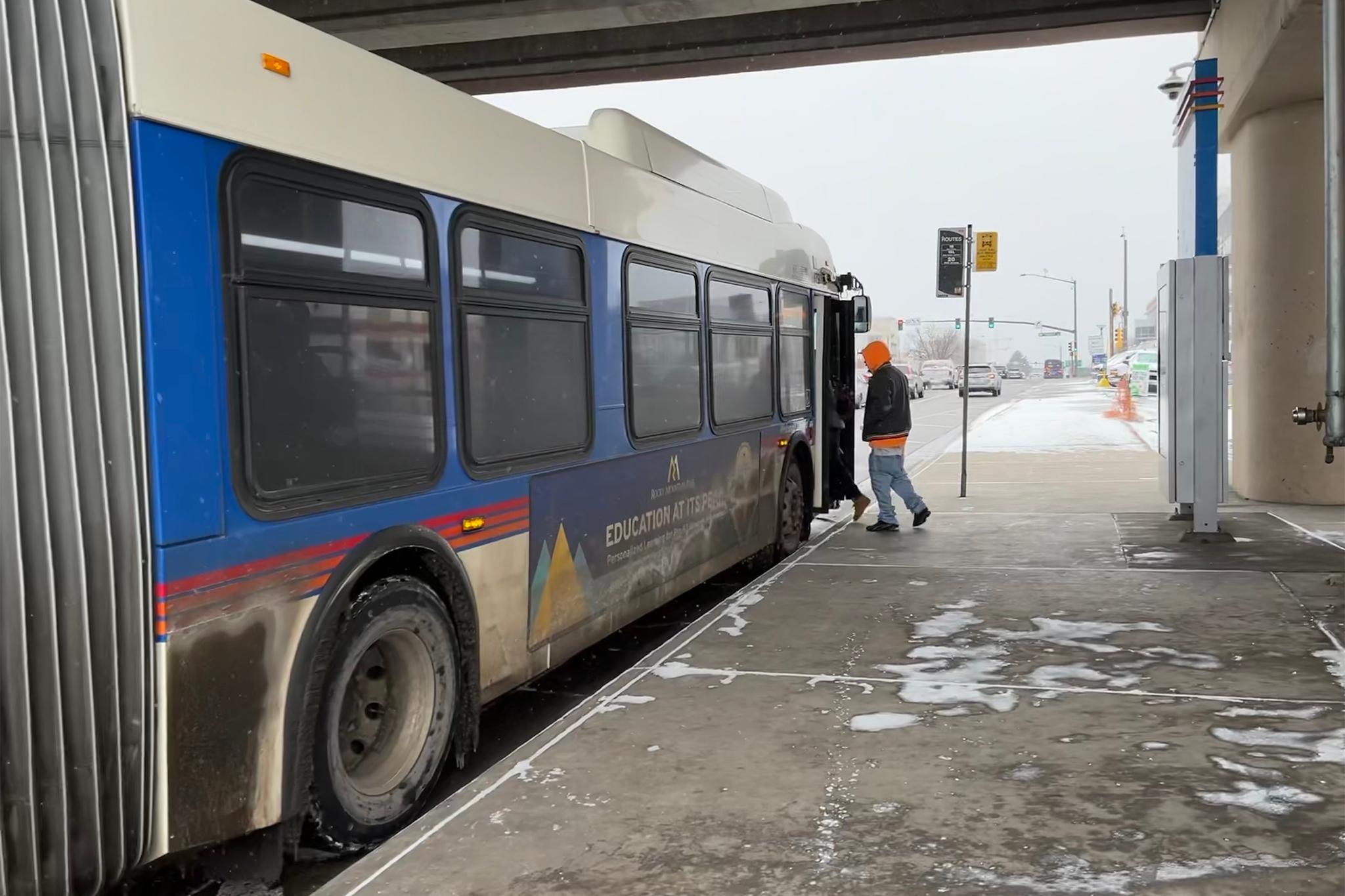
The 15L bus, one of RTD's most ridden, reaches its easternmost terminus at the Aurora Metro Center station. A man exited, then walked straight for the westbound bus heading back to Denver.
This reporter briefly described RTD's proposed rule change that could limit his ability to ride this way in the future. He declined to be interviewed.
Some 15 minutes later, he was stretched out across four seats in the back of the bus, sleeping.
5:45 p.m. - W-Line in Lakewood
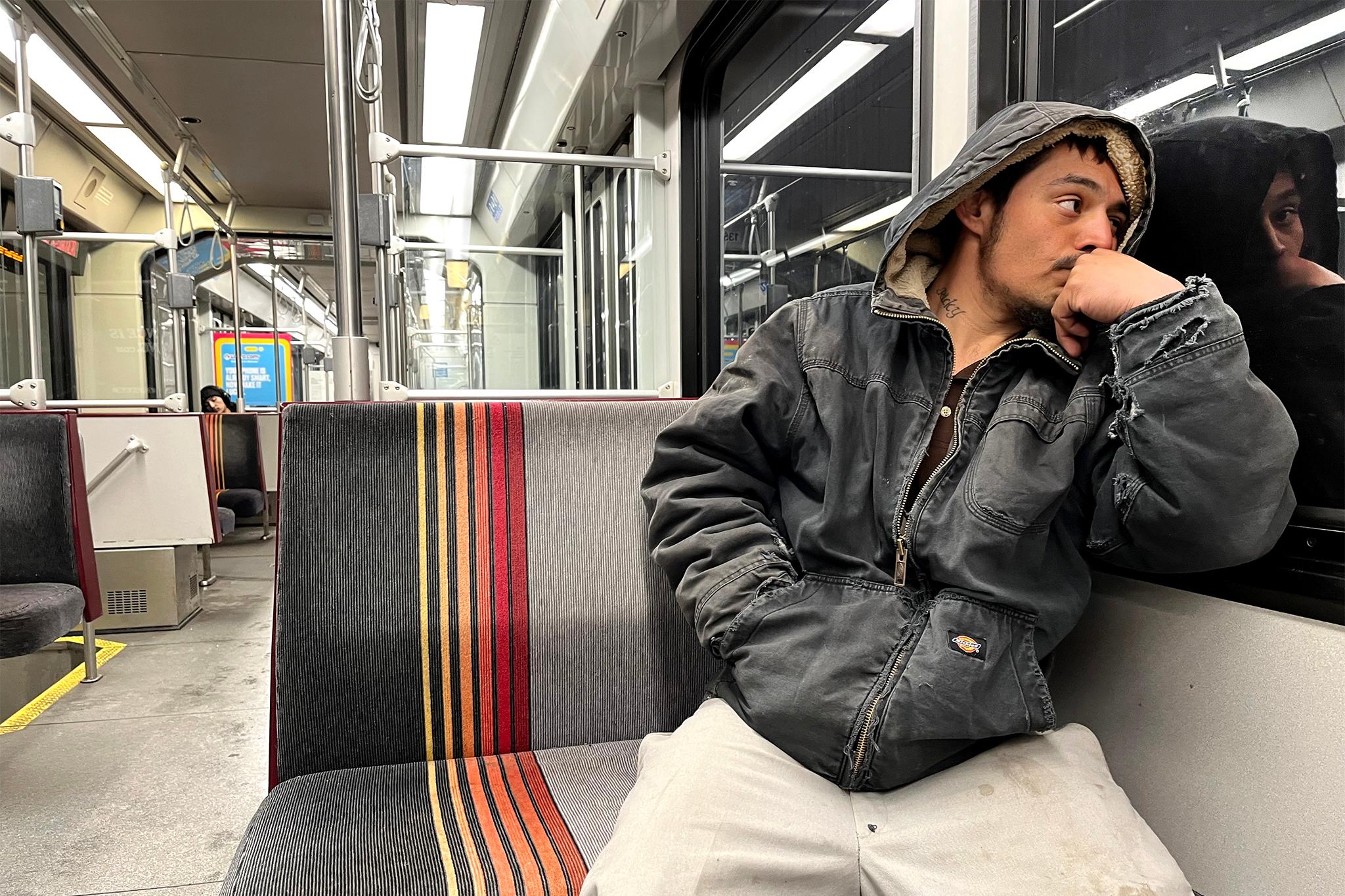
The W-Line was already mostly empty after a light evening rush hour. Gil Lobato, 34, carried a box holding a sweatshirt, a bunch of garlic, and a prayer book. He pulled a sheet of paper out of the book with information about emergency shelters. But it was already getting late and most of them are miles away.
"I'm worried," he says of the rapidly approaching night. "I don't know what's going to happen."
Lobato, a Denver native, said he's been homeless for about five years. He spent the night before sleeping in a hallway. It doesn't really matter where he sleeps, Lobato said, as long as it's warm.
"Times like this, you need to just have faith," he said, on what happened to be Ash Wednesday, a solemn Christian holy day of prayer, fasting and the contemplation of human mortality.
Lobato cited Job, who, according to ancient Hebrew scripture, was a rich man who lost everything -- his possessions, his children, and his own health. But he refused to curse God, and was ultimately rewarded with more riches and a long life.
"He trusted God," Lobato said. "... so I trust God."
6:30 p.m. - W-Line in Lakewood

Despite the cold -- the temperature was hovering around zero -- Brandon Copeland couldn't sell the new puffy jacket he'd been carrying all day. It was a gift from a social service center, he said, but he already had enough coats and was looking to make a few dollars so he could buy food.
"That's my way of doing things," he said. " I'm kind of an everyday type hustler, you know?"
Copeland, 37, said he's tried to get into real estate -- and has even taken classes. But a breakup, a methamphetamine addiction, and the recent death of his mother have kept him down.
"When my mom died, I'd never been out on my own before .... There was no more her sending me money," he said. "It's just been a lot right now. It isn't hindering me, but I'd rather process it before I try to get back into society."
Copeland said RTD's light rail system has turned out to be a "lifesaver" since he became homeless. Buses are quiet. Commuter rail lines, like the A-Line to the airport, have more security. But on the light rail lines, he's found a warm, safe place to socialize with others in similar situations.
"You get to go different places, see different people. You get to look around at the city," he said. "I don't think RTD really knows the platform they really have set up for us. I don't think they know the depths of it and how much we appreciate it."
Some homeless people observe an "unspoken law" that they take the last train car, Copeland said, and leave the front cars to commuters and families. He said he understands RTD's chief of police, who has said that RTD is not a homeless shelter. But he said it's on RTD to "partner up" with city leaders and social service agencies to address the problem.
Without that, Copeland said, a ban on riding all day will be fatal.
"There are a lot of people that will freeze to death," he said. "Drug usage will probably go up because ... that's one way we stay warm. Either we numb ourselves so we can't feel the chill, or we speed ourselves up so our body's maintaining a ... warm temperature."

8:30 p.m. - E-Line in Greenwood Village, Denver
Dusty Olson walked onto the E-Line wearing a blanket. He'd cut a hole in the middle for his head, and underneath was a giant suitcase full of clothing. He took the blanket off, calmly opened the suitcase and then started putting on layer after layer.
Olson, 38, said he was planning to find a quiet spot to set up a blanket tent and light up a bowl of rubbing alcohol to stay warm.
"I'm Native American, so I'm pretty resourceful," he said.

But isn't he worried about setting something on fire?
"Not really. It happens occasionally," he said, like when he moves in his sleep.
He paused, then added: "I've actually had friends that have died setting themselves on fire, just trying to stay warm."
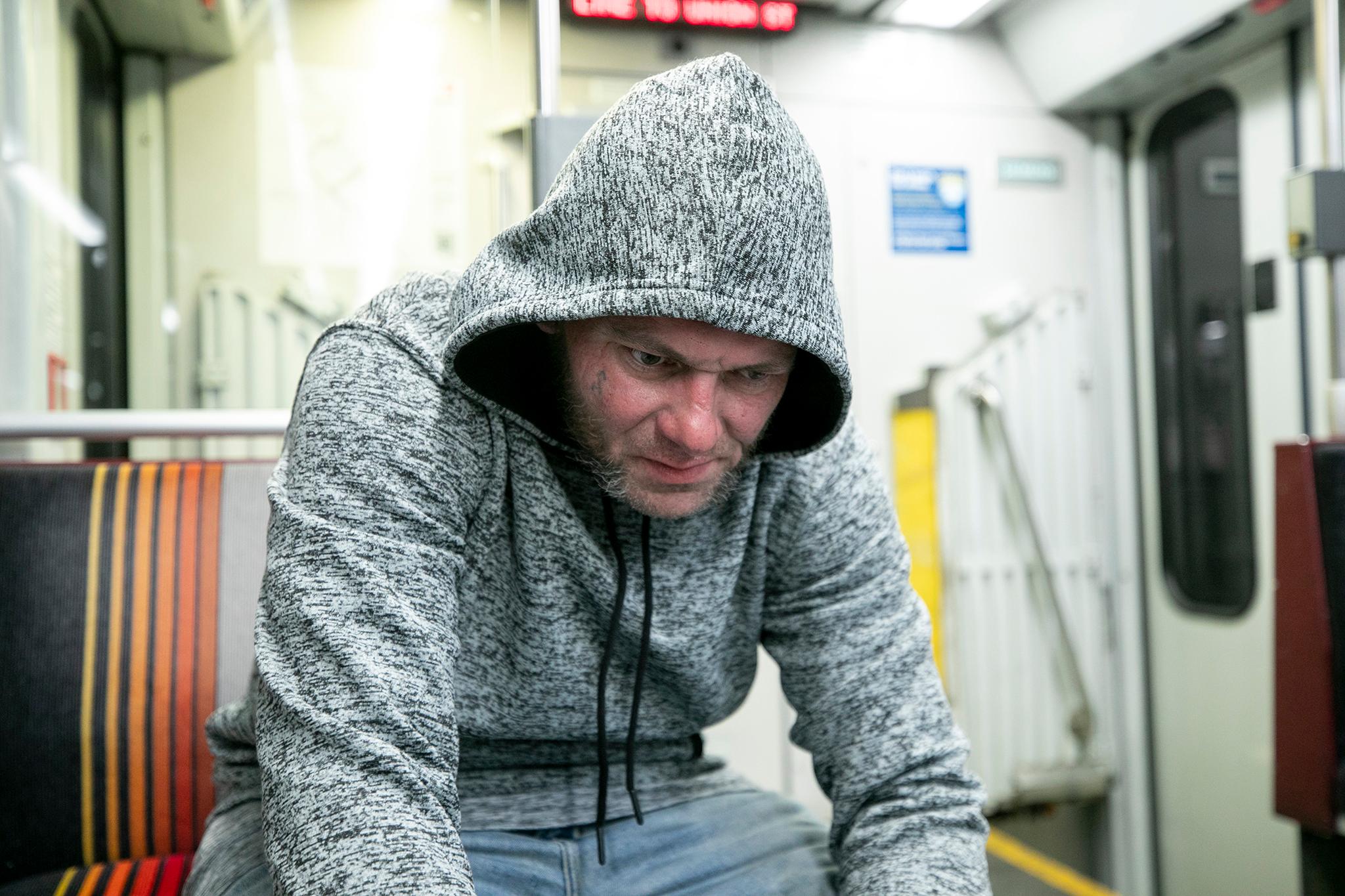
10:32 p.m. - W-Line in Lakewood
Aaron Gallegos, 21, and a friend stood shivering at the Garrison Station in Lakewood. The temperature was now 6 degrees below zero. Where were they going?
"Don't know," Gallegos said. "I don't think we're going to sleep tonight."
They boarded the last downtown-bound W-Line train of the night. The friend soon left to join others in a station elevator, which by now were visibly crowded at a number of stations.
Gallegos pressed on alone, as he said he's often been since his mother died of COVID last year. He can't say exactly when that happened -- a brain injury impairs his memories. But he knows it resulted in him becoming homeless and picking up a fentanyl habit.
"It's been lonely," Gallegos said.
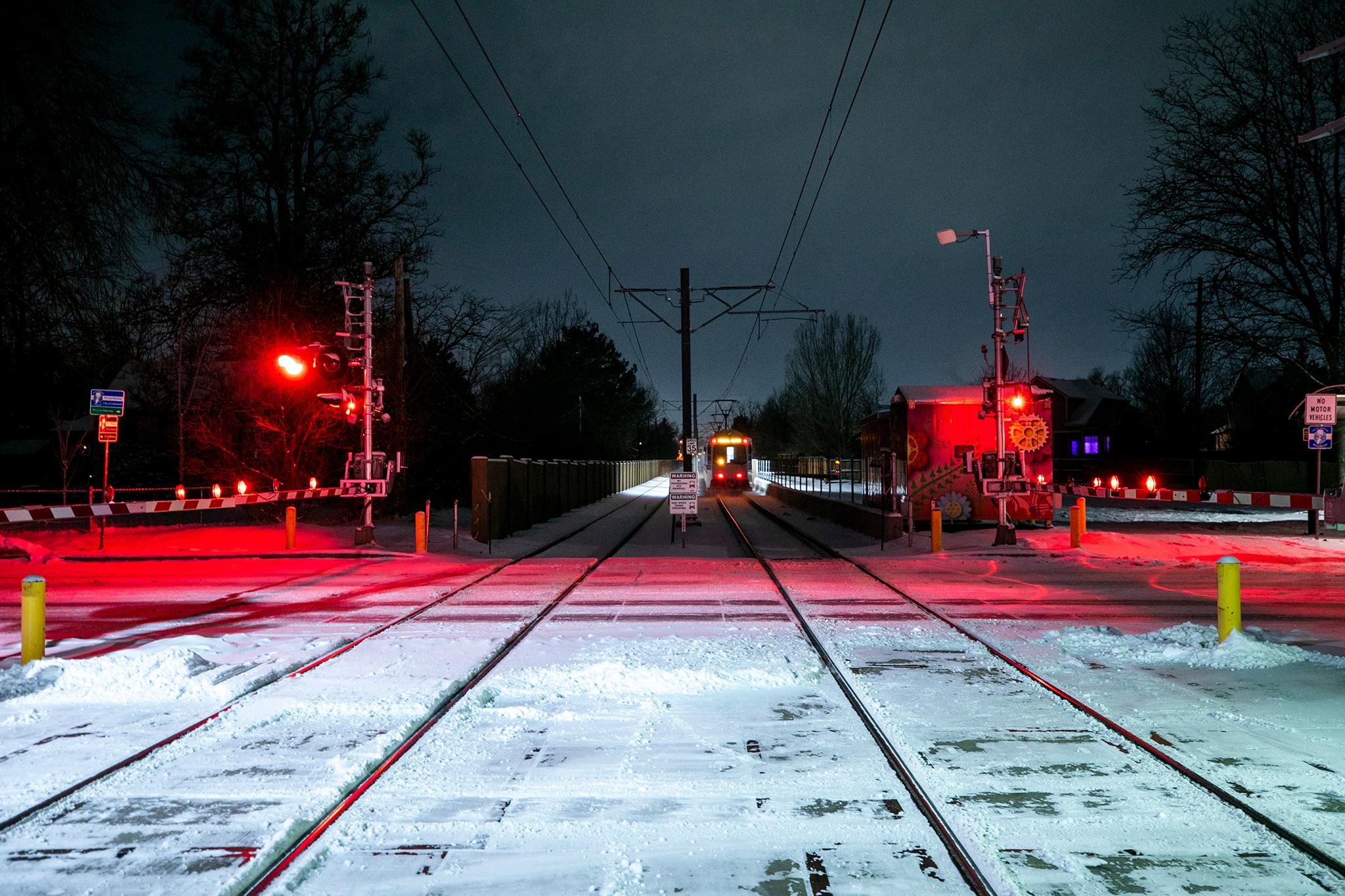
He can be hard on himself, he said, blaming his misfortune on his own mistakes. So he'll perform small penances like picking up trash or shoveling snow to make himself feel better.
"I know it's going to help me in the long run, or wherever I go when I pass away," he said.
Gallegos said he rode RTD trains all day. He prefers them over shelters because he can mostly keep to himself. He was one of only a few homeless people who told Denverite they liked RTD's proposed crackdown on indefinite riding. Other people abuse the trains, he said, violating the "peace and freedom" he otherwise finds on them.
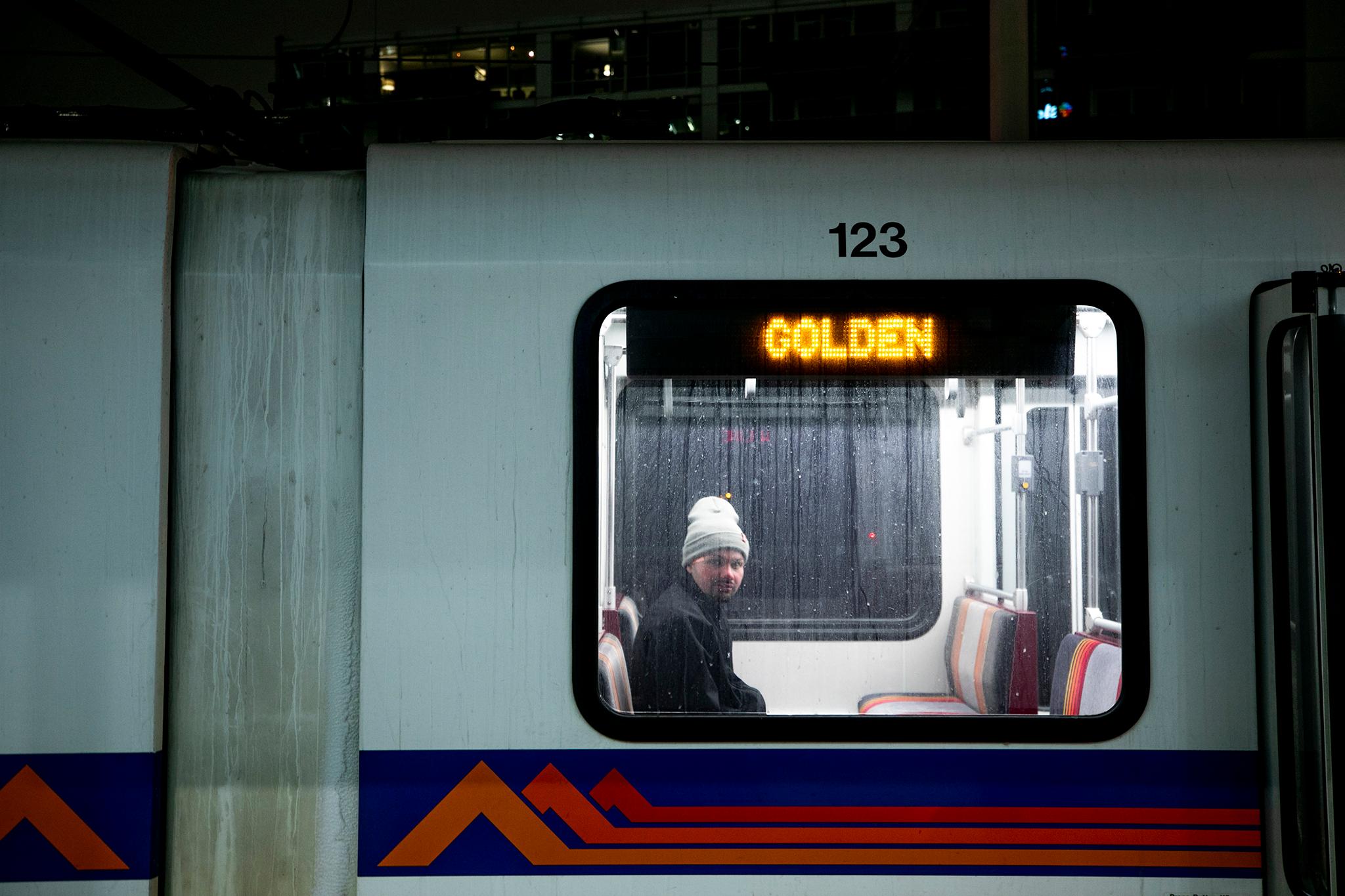
The train pulled into Union Station just before 11 p.m. A few people lingered on board, as a disembodied voice declared "THIS TRAIN IS NOT IN SERVICE" about a dozen times. Then the doors shut and it pulled away.
One last W-Line train remained at the platform, destined for the western suburbs. Security guards were already on board. They'd clear out the train about 40 minutes later, leaving its passengers to fend for themselves at stations far away from just about anything.
Gallegos hesitated, and then climbed on board for one more ride.













